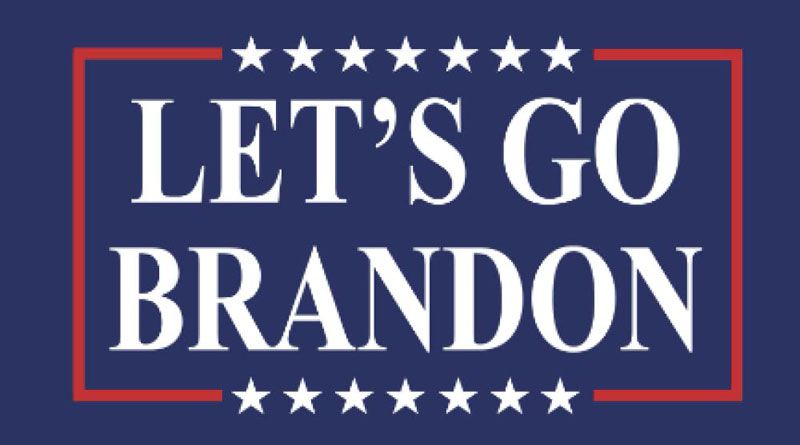Introduction
In recent times, the phrase “Let’s Go Brandon” has become a cultural and political lightning rod, inciting passionate debates and discussions across the United States and even beyond. This seemingly innocuous phrase has garnered widespread attention, sparking curiosity and controversy in equal measure. In this blog article, we will delve into the origins of “Let’s Go Brandon,” explore the various interpretations and controversies surrounding it, and examine its impact on the political and cultural landscape.
Origins of “Let’s Go Brandon”
The phrase “Let’s Go Brandon” originated from a NASCAR race held at the Talladega Superspeedway on October 2, 2021. During a post-race interview, NBC reporter Kelli Stavast was attempting to conduct an interview with NASCAR driver Brandon Brown, who had just won his first Xfinity Series race. However, the crowd in the background was chanting a different phrase, one that sounded quite different from “Let’s Go Brandon.”
The crowd’s chants, which some claim were derogatory and directed at President Joe Biden, sounded like “F**k Joe Biden.” To make the situation more family-friendly and in accordance with broadcasting standards, the reporter, Kelli Stavast, erroneously reported the crowd’s chant as “Let’s Go Brandon.” The video of this interview went viral on social media, and the phrase “Let’s Go Brandon” was born.
Interpretations and Controversies
“Let’s Go Brandon” has since become a slogan with various interpretations, and its use has generated a considerable amount of controversy. Here are some of the main ways people interpret the phrase:
- Political Opposition: Many see “Let’s Go Brandon” as a form of political protest against President Joe Biden and his administration. It is used by those who disagree with the president’s policies and decisions, and it has become a rallying cry for those critical of the current administration.
- Satirical Commentary: Some individuals view “Let’s Go Brandon” as a humorous and satirical commentary on the state of American politics. They see it as a way to express their discontent with the political climate in a lighthearted manner.
- Freedom of Speech: Supporters of “Let’s Go Brandon” argue that it represents freedom of speech and the right to express dissenting opinions in a democratic society. They assert that the phrase is a symbol of resistance against perceived government overreach.
- Covert Vulgarity: Despite its initial use to censor explicit language, some people continue to associate “Let’s Go Brandon” with the explicit phrase it was meant to replace. This interpretation is controversial and has led to debates about the phrase’s appropriateness.
The controversy surrounding “Let’s Go Brandon” has taken on several dimensions:
- Mainstream Media Attention: The phrase’s rise to prominence has led to extensive media coverage and analysis, with some outlets exploring its origins and the political and cultural implications.
- Political Responses: Politicians from both sides of the aisle have reacted to “Let’s Go Brandon.” Some have criticized it, while others have embraced it as a form of grassroots political expression.
- Commercialization: The phrase has found its way into various forms of merchandise, including clothing, stickers, and more. This has raised questions about the commercialization of political slogans and whether it dilutes their impact.
Impact of “Let’s Go Brandon”
The impact of “Let’s Go Brandon” extends beyond the catchy slogan itself. It has affected politics, culture, and media in various ways.
- Political Polarization: The phrase has further deepened political polarization in the United States. Supporters of President Biden view it as disrespectful and offensive, while critics argue that it reflects their legitimate concerns and grievances.
- Free Speech Debates: “Let’s Go Brandon” has sparked debates about the limits of free speech and the boundaries of political expression. Some argue that it is a manifestation of free speech, while others contend that it is disrespectful and offensive.
- Cultural Significance: The phrase has entered the cultural lexicon, becoming a symbol of resistance and dissent. Its widespread use signifies a cultural response to current political realities.
- Popularity in Pop Culture: “Let’s Go Brandon” has made appearances in various forms of pop culture, from music to comedy sketches. Its omnipresence in these spheres highlights its relevance and impact.
- Online Engagement: Social media platforms have played a significant role in amplifying and spreading the phrase. It has become a trending hashtag on platforms like Twitter, where users engage in discussions and debates.
- Commercialization: As mentioned earlier, “Let’s Go Brandon” has been commercialized, with various entrepreneurs capitalizing on its popularity by selling branded merchandise. This has created economic opportunities for some and generated criticism from others.
Conclusion
The phrase “Let’s Go Brandon” may have humble origins in a post-NASCAR race interview, but it has since evolved into a potent symbol of political dissent, cultural commentary, and free speech debates. The controversy surrounding it has deepened political divisions and generated extensive media attention, making it a subject of interest for people from various walks of life. As this phenomenon continues to unfold, it remains a fascinating case study in the intersection of politics, culture, and media in the modern era.

Reblog It collaborates closely with clients to develop tailored guest posting strategies that align with their unique goals and target audiences. Their commitment to delivering high-quality, niche-specific content ensures that each guest post not only meets but exceeds the expectations of both clients and the hosting platforms. Connect with us on social media for the latest updates on guest posting trends, outreach strategies, and digital marketing tips. For any types of guest posting services, contact us on reblogit.webmail[at]gmail.com.
